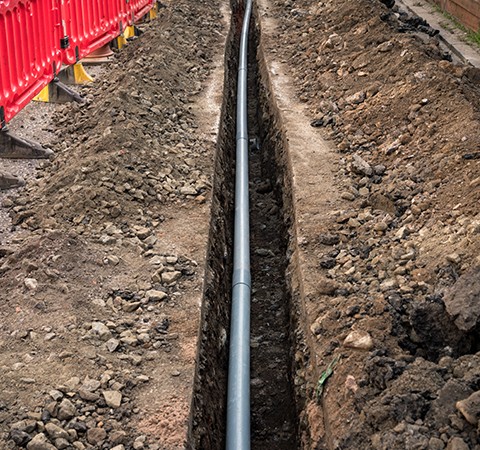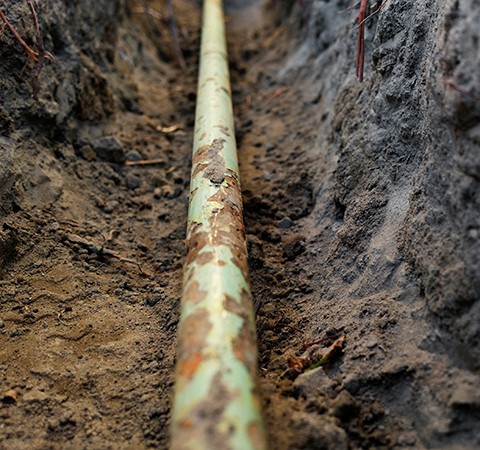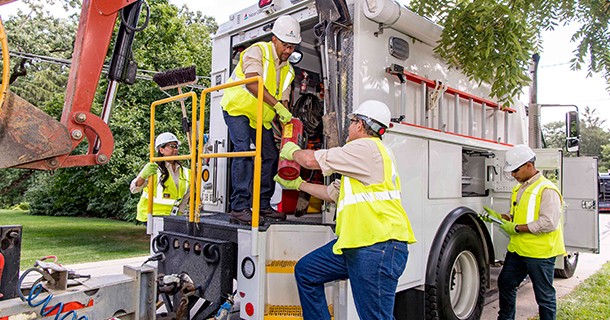Pipeline Safety
We are committed to maintaining a safe and reliable natural gas pipeline infrastructure that serves the needs of customers, including working with local/regional response officials located near our pipeline facilities to ensure a better understanding of the nature of our infrastructure and our emergency preparedness. Nicor Gas's Technical Compliance Department, a part of the Engineering group under the direction of the Vice President of Supply Operations, oversees the policies, standard practices and programs in regards to natural gas pipeline safety. The department acts as a liaison between Nicor Gas and state and federal regulatory agencies to ensure that the company complies with the various pipeline safety laws and regulations.


Underground Pipeline Markers
Natural gas companies, including Nicor Gas, install above ground pipeline markers to indicate the approximate location of buried large-diameter, high pressure gas transmission lines. These line markers display the name of the pipeline operator and the telephone number where the operator can be reached in case of an emergency. Line markers are placed at public road crossings except in urban areas. Pipeline markers and warning signs indicate only the presence of a pipeline. They should not be used or relied upon to determine the exact location of the pipeline.
What We Do To Keep You Safe
Our Gas Control Operations Center continuously monitors the flow of natural gas through our pipelines and any changes in operating conditions. Our employees have the ability to adjust flows and operation pressures, and to shut off natural gas flowing in our larger pipelines.
Maintaining Your Gas Pipes
Nicor Gas regularly monitors the pipelines up to your meter that deliver natural gas to your home or business for corrosion and leaks. You are responsible for maintaining the lines that begin at the meter and extend to the natural gas-burning equipment in your home or business, yard and any other buildings on your property.
If there is more than three feet between your meter and your home, Nicor Gas will monitor the primary pipeline. However, you are still responsible for repairs. (Nicor Gas does not monitor any fuel lines after the meter for business customers.)
You should periodically have your buried gas piping inspected for corrosion and leaks and have repairs made if any unsafe condition is found. Also, any repairs, locating and appliance connector replacements and inspections should only be performed by a plumbing contractor, heating contractor or other qualified professional. When excavating near buried gas piping, the piping should be located in advance, and the excavation done by hand.
Pipeline Integrity Management Plan
Pipeline integrity management is a process for assessing and mitigating pipeline risks in an effort to reduce both the likelihood and ramifications of incidents.
 186807563
186807563
Regulations & More Information
For more information about pipeline safety, we encourage you to visit the following websites:
Nicor Gas adheres to the Code of Federal Regulations Title 49: Part 191 & 192, issued by the Department of Transportation's (DOT) Pipeline and Hazardous Material Safety Administration (PHMSA). Acting through the Office of - Pipeline Safety, PHMSA administers the DOT's national regulatory program to assure the safe transportation of natural gas, petroleum and other hazardous materials by pipeline.
PHMSA requires that distribution systems comply with requirements for design, construction, testing, inspection, operations and maintenance from the point of connection to the Company's system through transmission up to and including the gas meter that is connected to a home.
Nicor Gas also complies with the requirements of Illinois Administrative Code Title 83. The Illinois Commerce Commission (ICC) enforces the Illinois Administrative Code Title 83: Public Utilities. The ICC's Natural Gas Pipeline Safety division inspects natural gas pipeline facilities to ensure compliance with all Federal and State safety rules and regulations pertaining to the design, construction, operation and maintenance of those facilities.




